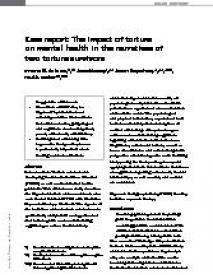Case report:The impact of torture on mental health in the narratives of two torture survivors
Key points of interest:
• The effects of NET may be improved by tailor-made or culturally sensitive interventions that address shame, guilt, disgust and cognitions about safety, trust, power, self-esteem, and intimacy.
• Building trust and taking time to pace the therapeutic process is particularly important when treating survivors of torture.
Abstract
Introduction:
Torture survivors risk developing Posttraumatic Stress Disorder (PTSD) as well as other mental health problems. This clinical case study describesthe impact of torture on two survivors who were treated for their PTSD with Narrative Exposure Therapy.
Method:
The reports of the narratives of two torture survivors were qualitatively analyzed. It was hypothesized that torture yields overaccommodating cognitions, as well as mental defeat, which in turn, are related to severity of psychological complaints.
Results:
Both patients have experienced an accumulation of traumatic events. The psychological and physical torture they experienced lead to increased anticipation anxiety, loss of control and feelings of hopelessness, as well as overaccommodating cognitions regarding self and others.
Conclusions:
Cognitions, culture and beliefs, as well as issues of confidence and a more long-term perspective affect therapeutic work. Building trust, pacing the therapeutic process, and applying tailor-made interventions that focus on cognitions regarding self-esteem, trust in relationships, as well as safety and control are warranted.
Geachte bezoeker,
De informatie die u nu opvraagt, kan door psychotraumanet niet aan u worden getoond. Dit kan verschillende redenen hebben,
waarvan (bescherming van het) auteursrecht de meeste voorkomende is. Wanneer het mogelijk is om u door te verwijzen naar de bron
van deze informatie, dan ziet u hier onder een link naar die plek.
Als er geen link staat, kunt u contact opnemen met de bibliotheek,
die u verder op weg kan helpen.
Met vriendelijke groet,
Het psychotraumanet-team.
In: Torture, ISSN 1018-8185 ; eISSN 1997-3322 | 28 | 2 | 130-139
https://doi.org/10.7146/torture.v28i2.106810


